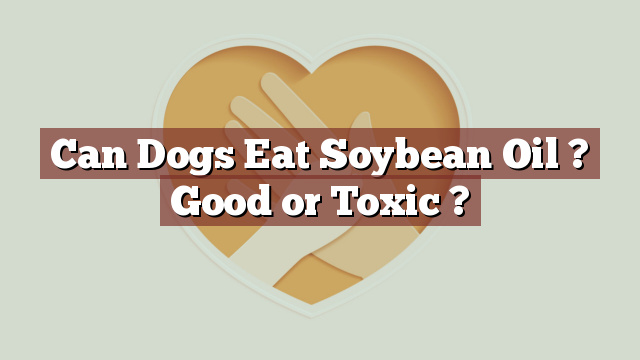Can dogs eat soybean oil? It’s important for pet owners to be aware of what foods are safe for their furry friends to consume. In this article, we will discuss the topic of whether dogs can eat soybean oil and whether it is good for them or potentially toxic.
Nutritional Value of Soybean Oil: What Does it Provide?
Soybean oil is a vegetable oil that is extracted from soybeans. It is commonly used in cooking and food preparation due to its mild flavor and high smoke point. In terms of nutritional value, soybean oil is rich in essential fatty acids, particularly omega-6 fatty acids. It also contains vitamin E, which is an antioxidant that helps to protect cells from damage.
Can Dogs Eat Soybean Oil? Is it Safe or Toxic?
Can dogs eat soybean oil? The simple answer is yes, dogs can consume soybean oil. In fact, it is a common ingredient in many commercial dog foods and treats. However, it is important to note that while soybean oil is generally safe for dogs, it should be consumed in moderation.
According to veterinarians, the omega-6 fatty acids found in soybean oil are beneficial for dogs. They play a role in maintaining healthy skin and coat, as well as supporting overall immune function. However, excessive consumption of soybean oil can lead to weight gain and other health issues. Therefore, it is recommended to consult with a veterinarian before introducing soybean oil into your dog’s diet.
Potential Risks or Benefits of Soybean Oil for Dogs
Moderate consumption of soybean oil can provide several benefits for dogs. As mentioned earlier, the omega-6 fatty acids in soybean oil can improve the condition of a dog’s skin and coat. They can also help to reduce inflammation in the body and support cardiovascular health.
On the other hand, excessive consumption of soybean oil can lead to weight gain, which may increase the risk of obesity and related health problems in dogs. Additionally, some dogs may be allergic to soy or develop digestive issues when consuming soybean oil. It is important to monitor your dog’s reaction to soybean oil and discontinue use if any adverse symptoms occur.
What to Do if Your Dog Eats Soybean Oil: Steps to Take
If your dog accidentally consumes a small amount of soybean oil, there is generally no cause for concern. However, if your dog ingests a large quantity or shows any signs of illness such as vomiting, diarrhea, or abdominal discomfort, it is advisable to seek veterinary advice immediately.
When contacting your veterinarian, provide them with information about the amount of soybean oil ingested and any symptoms your dog is experiencing. They will be able to assess the situation and provide appropriate guidance on how to proceed.
Conclusion: Is Soybean Oil Good or Toxic for Dogs?
In conclusion, dogs can eat soybean oil in moderation. It can provide some health benefits, particularly for their skin and coat. However, excessive consumption may lead to weight gain and other health issues. It is always best to consult with a veterinarian before introducing any new food or ingredient into your dog’s diet. As responsible pet owners, it is crucial to be aware of what foods are safe for our dogs to consume and to prioritize their well-being at all times.
Thank you for investing your time in exploring [page_title] on Can-Eat.org. Our goal is to provide readers like you with thorough and reliable information about various dietary topics. Each article, including [page_title], stems from diligent research and a passion for understanding the nuances of our food choices. We believe that knowledge is a vital step towards making informed and healthy decisions. However, while "[page_title]" sheds light on its specific topic, it's crucial to remember that everyone's body reacts differently to foods and dietary changes. What might be beneficial for one person could have different effects on another. Before you consider integrating suggestions or insights from "[page_title]" into your diet, it's always wise to consult with a nutritionist or healthcare professional. Their specialized knowledge ensures that you're making choices best suited to your individual health needs. As you navigate [page_title], be mindful of potential allergies, intolerances, or unique dietary requirements you may have. No singular article can capture the vast diversity of human health, and individualized guidance is invaluable. The content provided in [page_title] serves as a general guide. It is not, by any means, a substitute for personalized medical or nutritional advice. Your health should always be the top priority, and professional guidance is the best path forward. In your journey towards a balanced and nutritious lifestyle, we hope that [page_title] serves as a helpful stepping stone. Remember, informed decisions lead to healthier outcomes. Thank you for trusting Can-Eat.org. Continue exploring, learning, and prioritizing your health. Cheers to a well-informed and healthier future!

